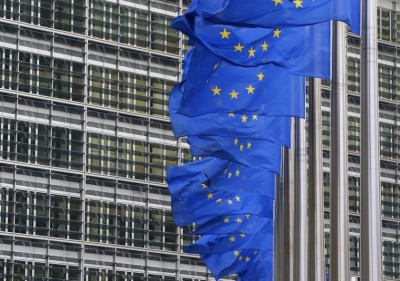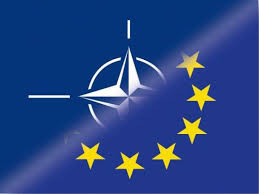US-EU-NATO War Drive against Russia: European Council President Backs Demands for EU Military Buildup

Yesterday evening, European Union (EU) Council President Donald Tusk addressed a letter to EU heads of state, formally inviting them to Friday’s summit in Bratislava. Summarizing talks he has held with officials across the continent, and painting a picture of escalating political disarray, Tusk declared that the British exit from the EU has unleashed a historic crisis of the entire Union.
“It would be a fatal error to assume that the negative result in the UK referendum represents a specifically British issue,” Tusk wrote. He added, “People in Europe want to know if the political elites are capable of restoring control over events and processes which overwhelm, disorientate, and sometimes terrify them. Today many people, not only in the UK, think that being part of the European Union stands in the way of stability and security.”
In the letter’s only reference of the economic distress and social anger of the European population amid the deepest crisis of world capitalism since the 1930s, Tusk briefly wrote: “Our citizens also expect the European Union to better protect their economic and social interests.”
Tusk went on to admit that the crisis of the EU is so deep that it threatens the survival of democracy in Europe: “History has taught us that this can lead to a massive turn away from freedom and the other fundamental values that the European Union is founded upon.” Tusk warned that, 15 years after the September 11 attacks, the “war on terror” has strengthened neo-fascistic forces. “The promise of a ruthless crackdown on terrorism,” he wrote, “has become one of the main slogans of right-wing extremists.”
Tusk’s response to his own assessment of the situation underscores the historic bankruptcy of the EU’s defenders. Having acknowledged that the European bourgeoisie’s law-and-order, anti-immigrant policies strengthen neo-fascistic forces and threaten a collapse into authoritarian forms of rule, Tusk called for continuing precisely these policies—that is, strengthening military and police forces and escalating the crackdown on refugees.
“In this context, the effective control of our external borders comes first, and has both practical and symbolic dimensions,” he declared. Attacking defenders of refugees’ right to asylum, he denounced “politically correct statements that Europe cannot become a fortress” and endorsed calls for blocking refugees from fleeing Syria and Iraq to Europe via the Balkans.
Tusk tacitly aligned himself on the consensus in the European ruling class in favour of the NATO war drive against Russia and of economically devastating social austerity policies. He was silent on the tens of millions of unemployed workers in Europe, and on the danger of a military clash between NATO and Russia, either on Russia’s borders or in Syria, as NATO escalates interventions in Eastern Europe and the Middle East.
With Tusk’s letter, the EU machine is backing proposals of Berlin and Paris, previewed in German and French papers, to reverse the break-up of the EU by turning it into a military alliance capable of waging major wars abroad and large-scale police operations at home.
Similarly, European Parliament Committee on Foreign Affairs chairman Elmar Brok called yesterday for escalating EU military capabilities and intervening in Syria.
Complaining that the EU is “too weak” and has “no political power,” Brok said, “I hope that [EU Commission president] Jean-Claude Juncker’s speech tomorrow to the European Parliament, and above all the heads of state and government meeting this week in Bratislava finally put a stop to this, build a European security and defence policy, and build common structures, so we play a role, also when our interests and values are at stake, if we can aid people. … I know the Syrian opposition is waiting for the Europeans finally to appear and not present this terrible spectacle.”
Such desperate attempts to recast the EU as a military-police regime testify to a historic breakdown of capitalism. Twenty-five years after the Stalinist bureaucracy dissolved the USSR in 1991, and the Maastricht Treaty founded the EU in 1992, pledging to safeguard peace, prosperity, and democracy, the European bourgeoisie has utterly repudiated these promises. Beset by economic crises for which it has no solutions, the escalating consequences of its own aggressive wars and rising social anger in the working class, it is staking everything on repression and war.
What dominates in European international relations is the failure of the EU to contain or address historically rooted conflicts between the European powers. Before the foundation of the EU, London and Paris were terrified by the implications of the reunification of Germany. French President François Mitterrand famously demanded that German Vice Chancellor Hans-Dietrich Genscher agree to a closer monetary union or face a possible alliance of France, Britain, and Russia against Germany, as on the eve of World War I.
Such economic and geostrategic conflicts are erupting again, with Britain facing years of bitter negotiations on the conditions of its exit from the EU, and conflicts rising between Germany, France and the southern and eastern European states that remain in the EU.
Yesterday, as the German press warned against the formation of a hostile southern European bloc including the eurozone’s number two and three economies, France and Italy, Luxembourg Foreign Minister Jean Asselborn flatly demanded the expulsion of Hungary from the EU. Asselborn warned that the reactionary, anti-immigrant policies of Hungarian Prime Minister Victor Orbán were a danger to human rights.
Speaking to Germany’s Die Welt, Asselborn said that in Hungary, “people who are fleeing war are treated almost worse than wild animals.” He attacked the fence built around Hungary’s southern borders to stop Middle East refugees, warning that it is “always getting longer, higher, and more dangerous. Hungary is not far from opening fire on refugees.”
Complaining that the EU claimed to “defend certain values outside its borders, but it is no longer capable of advancing them at home,” he said: “It would be helpful if the rules were changed so that suspending the membership of an EU member state no longer required unanimity [among the other EU member states].”
Asselborn’s comments exemplify the hypocritical propaganda of different EU powers, as they jockey for geo-strategic advantage. While attacking Hungary’s anti-immigrant policies, he failed to explain why, for instance, he did not call for France to also be expelled from the EU—though it is ruthlessly dismantling refugee camps in Calais, building fences to prevent refugees from travelling on to Britain, and sending police to assault and detain those who try.
Der Spiegel, for its part, warned of the implications of Brexit and of the September 9 Athens summit between France, Italy, Greece, Spain, Portugal, Cyprus and Malta, in a piece titled “The New Strength of Club Med.” It pointed to calls from French President François Hollande for an “economic growth program,” and Italian Prime Minister Matteo Renzi for a €50 billion investment fund.
Berlin had, it concluded, “due to the Brexit lost a powerful ally, Britain,” strengthening calls from southern European countries for a loosening of EU austerity policies dictated from Berlin. “We represent more than half of the EU,” Renzi said, “and that gives us weight.”
In fact, Hollande, Renzi, and their host Greek Prime Minister Alexis Tsipras all speak for deeply unpopular governments that have imposed austerity on the working class in an attempt to boost the profits of the banks, whose interests they represent. Amid the battle inside ruling circles for the division of these profits, however, their remarks drew a retort from German Finance Minister Wolfgang Schäuble, who said, “When the social-democratic party leaders meet, nothing terribly clever tends to come of it.”


